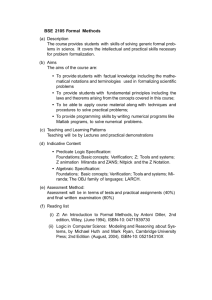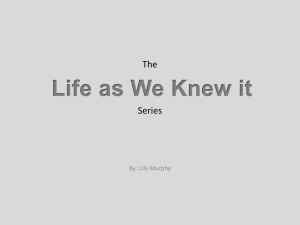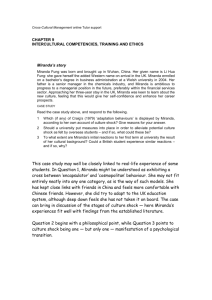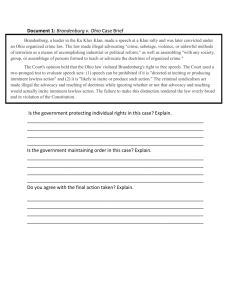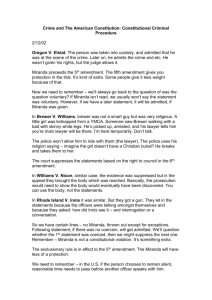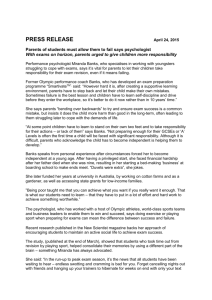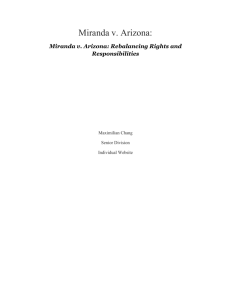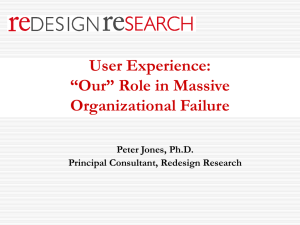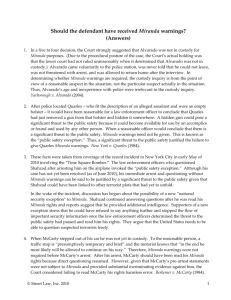You a Loser
advertisement
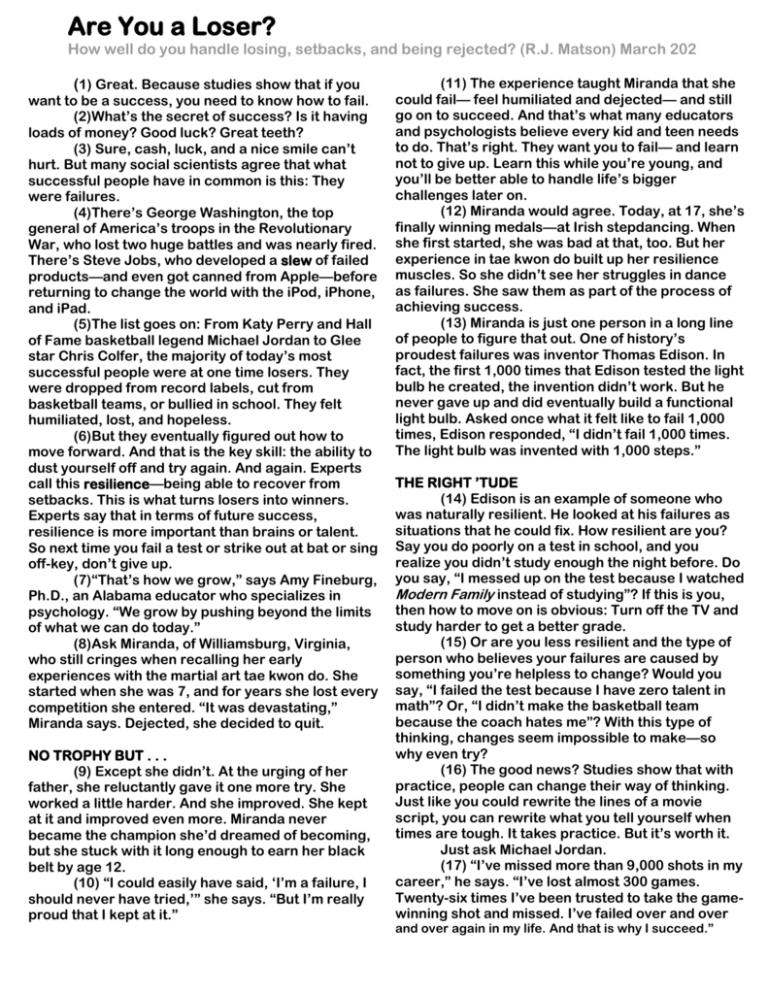
Are You a Loser? How well do you handle losing, setbacks, and being rejected? (R.J. Matson) March 202 (1) Great. Because studies show that if you want to be a success, you need to know how to fail. (2)What’s the secret of success? Is it having loads of money? Good luck? Great teeth? (3) Sure, cash, luck, and a nice smile can’t hurt. But many social scientists agree that what successful people have in common is this: They were failures. (4)There’s George Washington, the top general of America’s troops in the Revolutionary War, who lost two huge battles and was nearly fired. There’s Steve Jobs, who developed a slew of failed products—and even got canned from Apple—before returning to change the world with the iPod, iPhone, and iPad. (5)The list goes on: From Katy Perry and Hall of Fame basketball legend Michael Jordan to Glee star Chris Colfer, the majority of today’s most successful people were at one time losers. They were dropped from record labels, cut from basketball teams, or bullied in school. They felt humiliated, lost, and hopeless. (6)But they eventually figured out how to move forward. And that is the key skill: the ability to dust yourself off and try again. And again. Experts call this resilience—being able to recover from setbacks. This is what turns losers into winners. Experts say that in terms of future success, resilience is more important than brains or talent. So next time you fail a test or strike out at bat or sing off-key, don’t give up. (7)“That’s how we grow,” says Amy Fineburg, Ph.D., an Alabama educator who specializes in psychology. “We grow by pushing beyond the limits of what we can do today.” (8)Ask Miranda, of Williamsburg, Virginia, who still cringes when recalling her early experiences with the martial art tae kwon do. She started when she was 7, and for years she lost every competition she entered. “It was devastating,” Miranda says. Dejected, she decided to quit. NO TROPHY BUT . . . (9) Except she didn’t. At the urging of her father, she reluctantly gave it one more try. She worked a little harder. And she improved. She kept at it and improved even more. Miranda never became the champion she’d dreamed of becoming, but she stuck with it long enough to earn her black belt by age 12. (10) “I could easily have said, ‘I’m a failure, I should never have tried,’” she says. “But I’m really proud that I kept at it.” (11) The experience taught Miranda that she could fail— feel humiliated and dejected— and still go on to succeed. And that’s what many educators and psychologists believe every kid and teen needs to do. That’s right. They want you to fail— and learn not to give up. Learn this while you’re young, and you’ll be better able to handle life’s bigger challenges later on. (12) Miranda would agree. Today, at 17, she’s finally winning medals—at Irish stepdancing. When she first started, she was bad at that, too. But her experience in tae kwon do built up her resilience muscles. So she didn’t see her struggles in dance as failures. She saw them as part of the process of achieving success. (13) Miranda is just one person in a long line of people to figure that out. One of history’s proudest failures was inventor Thomas Edison. In fact, the first 1,000 times that Edison tested the light bulb he created, the invention didn’t work. But he never gave up and did eventually build a functional light bulb. Asked once what it felt like to fail 1,000 times, Edison responded, “I didn’t fail 1,000 times. The light bulb was invented with 1,000 steps.” THE RIGHT ’TUDE (14) Edison is an example of someone who was naturally resilient. He looked at his failures as situations that he could fix. How resilient are you? Say you do poorly on a test in school, and you realize you didn’t study enough the night before. Do you say, “I messed up on the test because I watched Modern Family instead of studying”? If this is you, then how to move on is obvious: Turn off the TV and study harder to get a better grade. (15) Or are you less resilient and the type of person who believes your failures are caused by something you’re helpless to change? Would you say, “I failed the test because I have zero talent in math”? Or, “I didn’t make the basketball team because the coach hates me”? With this type of thinking, changes seem impossible to make—so why even try? (16) The good news? Studies show that with practice, people can change their way of thinking. Just like you could rewrite the lines of a movie script, you can rewrite what you tell yourself when times are tough. It takes practice. But it’s worth it. Just ask Michael Jordan. (17) “I’ve missed more than 9,000 shots in my career,” he says. “I’ve lost almost 300 games. Twenty-six times I’ve been trusted to take the gamewinning shot and missed. I’ve failed over and over and over again in my life. And that is why I succeed.”

